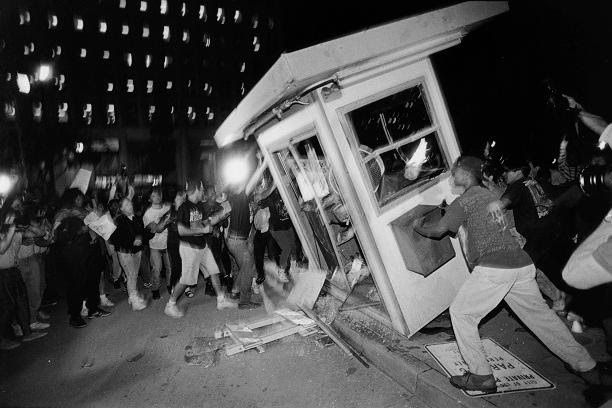
Before Ferguson and before Baltimore, there was a moment in American history that riveted the nation. The gruesome and horrific beating of motorist Rodney King sent shockwaves through the veins of Americans who were able to see police brutality without filters and in transparent living color. As if it was some sort of competitive sport of who could physically assault the negro more, L.A. cops took turns striking King like an animal over and over and over. In a premeditated sigh of relief, many African-Americans believed that finally police would be held accountable for their racist assault towards Black people ―especially because their violent assault was caught on tape. No one was prepared for the aftermath. Not even a clear videotape could convict cops for something as visible as the brutality they committed. Like the combination of hydrogen and oxygen atoms, the aftermath resulted in the explosion of the city of L.A. via protests that were bound to happen sooner or later.
Now, after 25 years, National Geographic Documentary Films presents ‘LA 92’, a riveting look back at the controversial Rodney King trial and subsequent protests, violence, and looting of the city. Viewed from a multitude of vantage points through visceral and rarely seen archival footage, the film brings a fresh perspective to a pivotal moment that reverberates to this day. Produced by Lightbox’s two-time Academy Award winner Simon Chinn (”Man on Wire”) and Emmy winner Jonathan Chinn (”American High”) with Academy Award-winning directors Dan Lindsay and TJ Martin (”Undefeated”), and featuring original music from Danny Bensi and Saunder Jurriaans (”OA,” “Enemy”), LA 92 premieres at the 2017 Tribeca Film Festival on Friday, April 21.
“Race relations is America’s Achilles’ heel,” said Lightbox producers Jonathan Chinn and Simon Chinn. “The production of this film might mark the 25th anniversary of this seminal uprising, but these kinds of events still recur, and we are still dealing with their root causes. Our goal with ‘LA 92’ is to reframe the story of this tragedy for a modern audience, and we hope it will encourage reflection and debate as we wrestle with these very real conflicts that continue to plague America’s cities.”
Following the premiere at Tribeca, the film completed a multicity screening tour including Baltimore; Charlotte; St. Louis; Washington, D.C.; and Atlanta. Additionally, a limited theatrical release in New York and Los Angeles begins Friday, April 28, and ‘LA 92’ makes its television broadcast debut on National Geographic on Sunday, April 30, at 9/8c and will also air globally in 171 countries and 45 languages. Furthering the national conversation, National Geographic has also partnered with Picture Motion to provide free screenings of the film to colleges and universities nationwide and has developed a robust, free discussion guide to accompany the film. For more information, visit natgeotvpressroom.com.

Using no narration or talking head interviews, the filmmakers decided to take a bold approach: to reconstruct the tumultuous events that unfolded in 1992 by exclusively using archival footage and photographs. Culling thousands of hours of visceral broadcast news footage, radio reports, police files and personal home videos ― some of which have never been broadcast ― the filmmakers tell the story through a variety of different points of view and perspectives and set it all to a rich orchestral score composed by Danny Bensi and Saunder Jurriaans.
“We come from a cinema verite background and as such, we are always striving to find ways to let the footage speak for itself,” said Martin and Lindsay, who also edited the film. “Our intent was to fully immerse viewers in a raw and unfiltered experience in order to challenge their understanding of the civil unrest, both emotionally and intellectually.”
The filmmakers sourced an intricate network of citizen journalists with boots on the ground during the civil disturbance to bring authenticity to the film. The film features never-before-seen and rarely used footage from the Los Angeles First AME Church, which supported many victims of the violence; materials from the Los Angeles police and fire departments; and video from contemporaneous news broadcasts from L.A.-based Korean-language television stations. ‘LA 92’ takes viewers out of the prism of their own cultural, racial and political perspectives and allows them to see the events of 1992 in a new light.
The film captures the shock, disappointment, and fury felt by many Angelenos, particularly those in the African-American community, following the outcomes of two back-to-back, highly publicized trials. In November 1991, a Korean convenience store owner who was convicted of fatally shooting African-American teenager Latasha Harlins was given no jail time by a white Los Angeles judge. Six months later, four police officers caught on videotape brutally beating unarmed black motorist Rodney King were acquitted of assault by a predominantly white Simi Valley jury.
The King verdict sparked a wave of violent protests, looting and arson that lasted several days and left more than 50 people dead, thousands injured and large swaths of Los Angeles ― including many Korean-American-owned businesses ― in ruins. In the case of the King beating, it was the first time the kind of abuse many had witnessed or experienced at the hands of LAPD officers was recorded and broadcast for the world to see, leaving some with the sense that if justice did not prevail despite such graphic evidence, it never would.